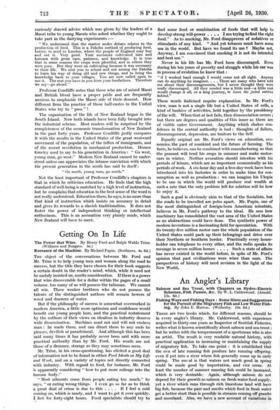Getting On In Life
Romance of the Machine. By Michael Pupin. (Scribners. 4e. 6d.) THE object of the conversations between Mr. Ford and Mr. Trine is to help young men and women along the road to success, but the title they have chosen for their book suggests a certain doubt in the reader's mind, which, while it need not be unduly insisted on, merits consideration. If there is a power that wins discoverable for a dollar within the pages of a small volume, too many of us will possess the talisman. We cannot all win. Those weaker brethren who do not possess the talents of the distinguished authors will remain hewers of wood and drawers of water.
But if the philosophy of success is somewhat overworked in modern America, a little more optimism and confidence would benefit our young people here, and the practical restatement by the authors of their views on idealism in industry deserve wide dissemination. Machines need not and will not enslave -man : he made them, and can direct them to any ends he pleases, devilish or paradisiacal. And although this has been said many times it has probably never been said with more practical authority than by Mr. Ford. His words are not those of a dreamer, strange as they may sometimes seem.
Mr. Trine, in his cross-questioning, has elicited a good deal of information not to be found in either Ford Ideals or My Life and Work, and on a variety of topics not directly connected with industry. With regard to food, for instance, Mr. Ford is apparently considering " how to put more mileage into the human body."
" Most ailments come from people eating too much," he says, " or eating wrong things. I even go so far as to think a great deal of crime is due to this . . . . If I feel a cold coming on, which is rarely, and I want to get it over quickly.
fast for forty-eight hours. Food specialists should try to find some food or combination of foods that will help to develop strong will-power . . I am trying to find the right food." As to smoking, Mr. Ford disapproves of sedatives or stimulants of any kind " And yet tobacco must have some use in the world. But have we found its use ? Maybe not, Anyway, I am convinced that smoking it is not its intended and best use."
Never in his life has Mr. Ford been discouraged. Even'
during his ten years of poverty and struggle while his car was in process of evolution he knew that : " if I worked hard enough I would come out all right. Anyone can do anything he imagines. . . . There are many who have told me about their discouragements, but I never thought they were really discouraged. All they needed was a little rest—a little rest would change it all, or a long journey, to leave the jaded entities behind."
These words italicized require explanation. In Mr. Ford's view, man is not a single life but a United States of cells, a kind of beehive of activities, held together by the presidency of the will. When that at last fails, then disassociation occurs ; but there are degrees and qualities of this inner as there are of visible outer Government. Anything which shakes con- fidence in the .central authority is bad : thoughts of failure, discouragement, depression, are traitors to the Self.
Equally original are Mr. Ford's views on education, eco- - nomics, the past of mankind and the future of farming. The farm, he believes, can be combined with manufacturing so that the peasant will tend his crops in summer and make motor- cars in winter. Neither avocation should interfere with his periods of leisure, which are as important economically as his periods of work. A six-hour day and a five-day week have been introduced into his factories in order to make time for con- sumption as well as production : we can imagine his Utopia to be one in which the world will produce real wealth at such a rate that the only problem left for solution will be how to enjoy it.
Such a goal is obviously akin to that of the Socialists, but the roads to be travelled are poles apart. Mr. Pupin, one of the most distinguished of foreign-born American scientists, believes in Mr. Ford's pathway to the ideal. He sees how machinery has consolidated the vast area of the United States
as no abstractions could have done. The synthetic power of modern inventions is a fascinating field for speculation. With its twenty-five million motor cars the whole population of the United States could pack up their belongings and drive over their Northern or Southern border. Practically every house- holder can telephone to every other, and the radio speaks its message in seven million homes . . . . Such a state of affairs has never existed in the world before, in spite of Mr. Ford's opinion that past civilizations were wiser than ours. The perspectives of history will need revision in the light of the New World.




































 Previous page
Previous page